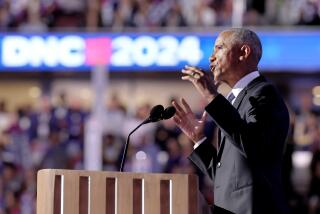Democrats Have More Pressing Concerns Than Bush’s Ride on Jet
Frustration, jealousy, genuine outrage: All of these emotions help explain the sharp Democratic criticism of President Bush’s dramatic “Top Gun”-like landing on the USS Abraham Lincoln this month.
But there’s also a political strategy behind at least some of the attacks -- and it’s being driven by other motivations. The pointed Democratic questions to the White House over the event’s cost and appropriateness are the political equivalent of a brushback pitch in baseball; the goal isn’t so much to hurt Bush as it is to make him think twice about using the military again as a potential campaign backdrop.
In some respects, the flap constitutes the first Democratic effort in months to replay the GOP tactics during Bill Clinton’s presidency, when congressional Republicans used every conceivable opportunity to accuse the White House of impropriety.
The new controversy even echoes some of those ancient disputes. The charge from Democrats that the White House delayed the Lincoln’s return in order to stage Bush’s speech declaring major combat at an end in Iraq recalls Republican accusations that Clinton held up airport traffic at Los Angeles International so he could get an expensive haircut on Air Force One.
And in carping about the event’s cost, Democrats are following the example of Rep. Dan Burton (R-Ind.), who thundered in outrage when he learned that reporters and White House aides traveling with Clinton had apparently pilfered $562 in towels and bathrobes from the aircraft carrier George Washington after a trip to Normandy in June 1994. “This is just a continuation of the arrogance of power which has been exhibited by this president and his administration,” Burton insisted, as if the staff had tried to divert the ship for a weekend on the Cote d’Azur.
Maybe the real lesson is that presidents should stay away from aircraft carriers named after their greatest predecessors.
Despite the surface similarities to early Clinton controversies, the underlying political calculus in the current matter is dissimilar.
From the outset of Clinton’s presidency, Republican accusations against him and his administration were intended to reinforce an image of the 42nd president as untrustworthy and dishonest. To the extent Democrats have a coherent political strategy in the new controversy -- and venerable Sen. Robert C. Byrd (D-W.Va.), the principal Senate critic of the event, isn’t known for clearing his outbursts with anyone -- they have a different goal.
Democrats aren’t really expecting to convince voters that Bush -- whose poll ratings on honesty and integrity are extremely high -- is unethical or dishonest (although the White House explanations for why Bush took a made-for-television jet ride, rather than a fusty helicopter trip, to the carrier have bounced around more than the ship itself in the tide).
Rather, Democrats are signaling to Bush that they will try to exact a cost if he moves too aggressively to draft the military as a prop for his reelection campaign.
Few Democrats think the Lincoln accusations will take much of a bite out of Bush’s support today. Some party strategists have even complained that the congressional Democrats raising the issue are helping Bush by providing cable networks an excuse to continue running the footage of the president sauntering across the ship’s deck in a jaunty flight suit.
But one Democratic operative involved in fanning the flames over the flight said that was a worthwhile price to pay to advance two other goals: Making the White House think twice about drafting a military audience for such a campaign-style event again and discouraging it from using footage from the Lincoln in campaign ads next year.
“I’d rather have it on television now and improve our ability to play defense on it 15 months from now,” the operative said.
For Democrats, there’s some logic in that. By laying down these accusations now, Democrats next year will be able to say Bush has proved their point if he does deploy the footage in a campaign commercial.
But it’s another question whether fear of that accusation will, in fact, dissuade the White House. One senior GOP strategist familiar with White House thinking said the charges won’t affect such decisions “one way or the other. If it makes sense and we think it is appropriate, we will do it.”
The Lincoln controversy may have reached the point where White House strategists will have to hesitate about using the event in ads. But it’s less likely to deter them from their emphasis on placing Bush before military audiences and settings -- because that’s an intrinsic part of his job in this unsettled era and because they realize his record on national security is his best asset in 2004.
That latter point may be the real foundation of this controversy. Victory in Iraq has swelled Bush’s approval ratings on all issues, domestic and foreign. But unless the economy revives, it’s likely that within a few weeks he’ll drift back to his position before the war, when the vast majority of Americans judged him a success at defending the nation and a smaller majority rated him a failure at managing the economy.
In that environment, Bush has a powerful incentive to highlight his role as commander in chief -- and Democrats an equal incentive to place limits on how he uses the military in that political effort. More Lincoln-type collisions may be inevitable.
Ultimately, however, Democrats will get only so far raising these relatively petty arguments about photo-ops and flight suits. The real challenge for the party is to find a nominee the public finds credible as commander in chief.
Which is why the Lincoln flap isn’t nearly as important to Democratic prospects next year as the ability of the party’s presidential candidates to fill in their emerging criticism of Bush’s strategies for homeland security and foreign policy.
On the homeland security front, the Democratic contenders are trying to build a case that Bush is under-funding the nation’s domestic defenses because of his devotion to tax cuts. And in foreign policy, all of the leading Democrats are arguing that Bush has isolated America in the world by unnecessarily alienating allies.
Democrats have a long way to go to sell most Americans on the argument that Bush is setting the wrong course on national security. But even amid the tumult over his jet ride, they have far more at stake in challenging the president’s destination than his choice of transportation.
*
Ronald Brownstein’s column appears every Monday. See current and past Brownstein columns on The Times’ Web site at www.latimes.com/brownstein
More to Read
Get the L.A. Times Politics newsletter
Deeply reported insights into legislation, politics and policy from Sacramento, Washington and beyond. In your inbox three times per week.
You may occasionally receive promotional content from the Los Angeles Times.










